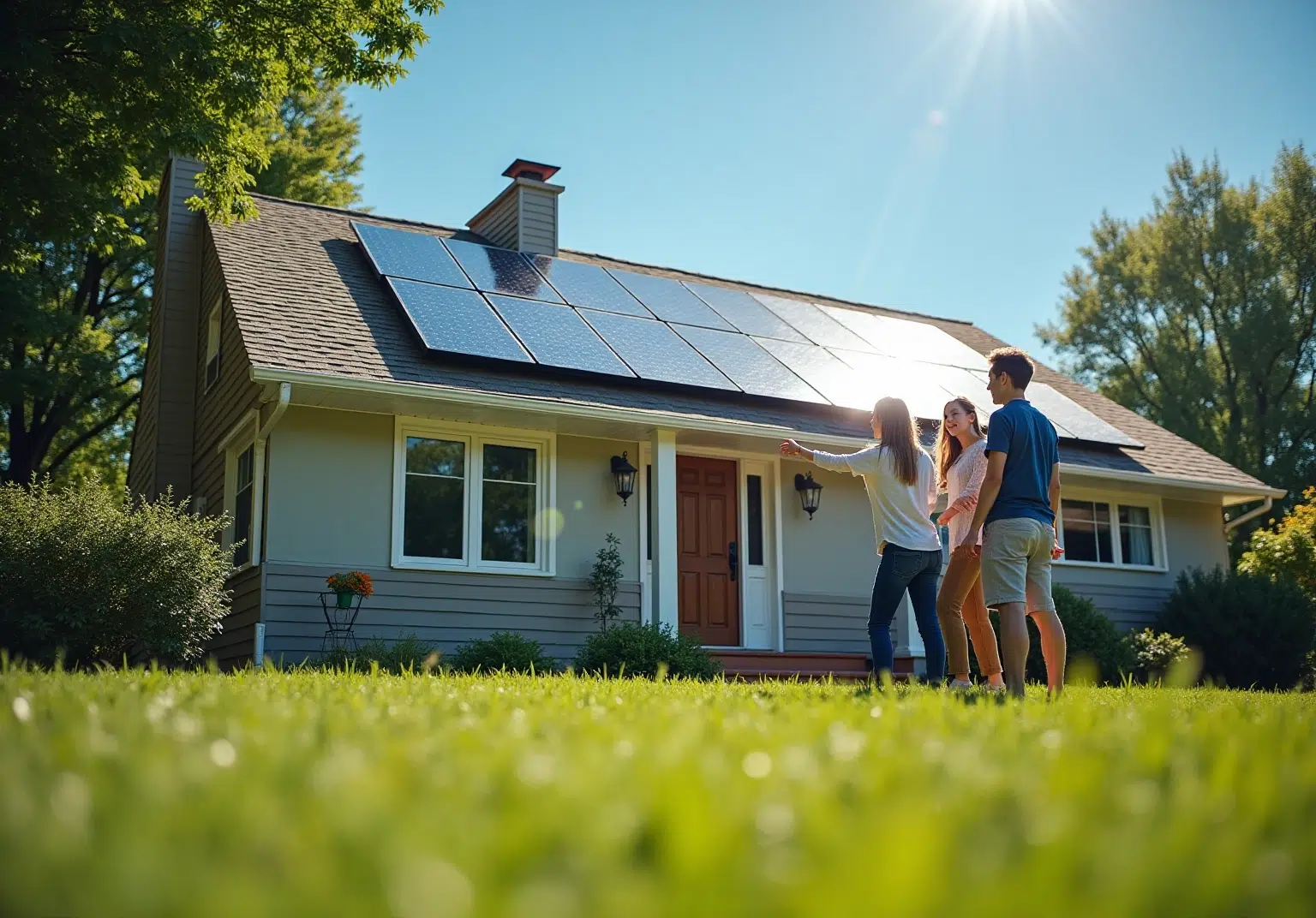Overview
In today’s world, many homeowners are understandably concerned about rising energy bills. The article thoughtfully compares various solar system kits for home use, examining their key features, types, and leading brands to help you make an informed decision. It highlights essential factors such as:
- Efficiency
- Warranty
- Installation ease
- Battery storage
- Cost
By exploring the pros and cons of off-grid, hybrid, and grid-tied systems, we aim to empower you to choose the best option for your energy needs.
We understand that navigating these choices can feel overwhelming, but embracing solar energy can lead to greater energy independence and long-term savings. Together, we can explore sustainable solutions that not only benefit your household but also contribute positively to the environment. Remember, you’re not alone on this journey; we are here to support you every step of the way.
By considering these options, you can take a proactive approach towards reducing your energy costs and enhancing your home’s sustainability. If you’re ready to explore further, please reach out for guidance and support. Let’s work towards a brighter, more energy-efficient future together.
Introduction
As energy costs continue to rise, we understand that many homeowners are feeling the strain on their budgets and are increasingly seeking sustainable solutions to reduce their bills and enhance their property value.
Solar system kits present a compelling option, offering a range of components designed to harness the sun’s power efficiently. However, it’s common to feel overwhelmed with the various types and brands available.
How can you navigate these complexities to find the perfect fit for your energy needs? This article delves into the essential features and leading brands of solar system kits, equipping you with the knowledge to make informed decisions for a greener, more cost-effective future.
Together, we can explore the benefits of embracing solar energy, paving the way for energy independence and a brighter tomorrow.
Understanding Solar System Kits: An Overview
We understand that energy bills can be a source of stress for many homeowners. Photovoltaic collections offer a nurturing solution, providing extensive, pre-assembled options, including a solar system kit for home, designed to capture sunlight for home applications. Typically, a solar system kit for home includes essential components such as solar panels, inverters, charge controllers, and, in some cases, batteries. They can be categorized into three primary types:
- Off-grid systems operate independently of the utility grid, granting homeowners complete energy autonomy.
- Combined setups can link to the grid while integrating battery storage, enabling power use during outages and maximizing savings.
- Grid-connected setups depend on the grid for power supply but can return surplus power back into it, making them a budget-friendly option for residences linked to the grid.
Every kind of solar system kit for home harnesses sunlight to meet various requirements, from achieving complete power independence to providing cost-effective solutions for grid-connected homes. As the market for sunlight-based solutions continues to grow, we see a rising acceptance of hybrid systems, motivated by the need for power resilience and autonomy. In 2023, residential power generation from sunlight in the U.S. reached 49.3 TWh, with California contributing 19.1 TWh, highlighting our increasing dependence on renewable energy.
Moreover, research indicates that homeowners can significantly boost their property value through energy installations. For every dollar saved each year, there’s a corresponding $20 rise in home value. This underscores the economic advantages of investing in renewable energy packages, making them an appealing choice for environmentally conscious homeowners. Together, we can embrace these solutions to create a sustainable future.
It’s important to note that sunlight generation can be significantly reduced during cloudy weather, which emphasizes the value of battery storage in maintaining energy supply during less-than-optimal conditions. Let’s work towards a more resilient energy future, ensuring that your home remains powered and your investment protected.
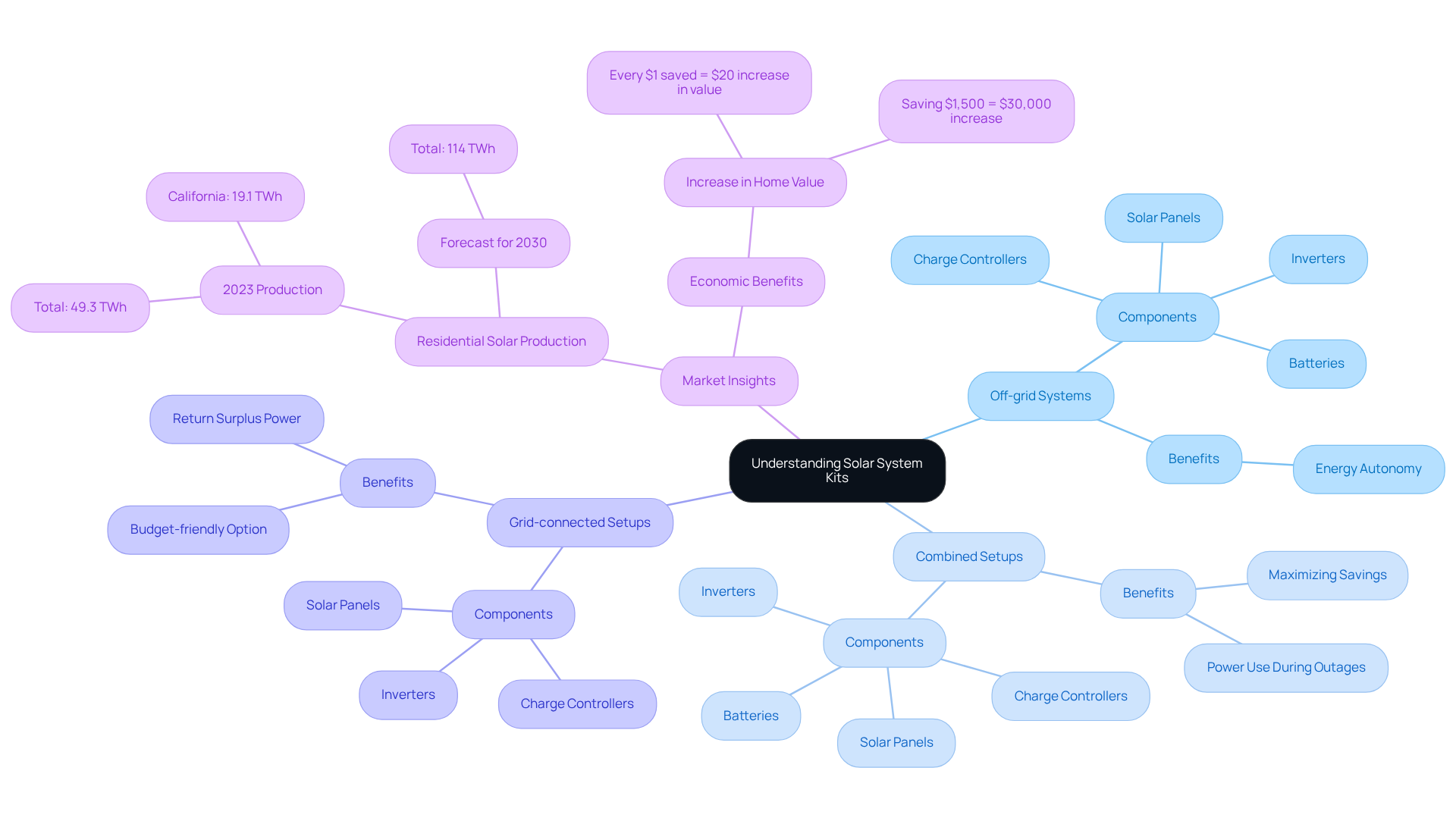
Key Features to Compare in Solar System Kits
When considering solar system kits, it’s important to reflect on several key features that can significantly impact your energy experience:
-
Efficiency: This crucial metric reveals how effectively photovoltaic panels convert sunlight into electricity. Higher efficiency ratings, particularly those exceeding 22%, allow for greater power generation in limited space, making them ideal for homes with smaller rooftops. For instance, Maxeon’s solar panels achieve an impressive efficiency of 24.1%, while REC panels can reach up to 22.6%.
-
Warranty: A longer warranty period often signifies superior quality and reliability. Look for comprehensive warranties that cover both the product and performance. Brands like Panasonic offer a 25-year warranty guaranteeing at least 92% power output after 25 years, ensuring long-term reliability and peace of mind.
-
Installation: We understand that installation can be a concern. Some kits are tailored for easy DIY installation, while others may necessitate professional assistance. Assess your comfort level with installation tasks, as improper installation can lead to reduced efficiency and potential safety hazards. Professional installers ensure proper mounting and compliance with local codes, which significantly impacts long-term performance.
-
Battery Storage: If you’re considering off-grid or hybrid setups, battery capacity is crucial for retaining surplus energy for use during non-sunny intervals. However, incorporating battery storage can raise total expenses by more than $15,000, an essential factor for homeowners to consider.
-
Cost: Evaluating the total cost of the kit is vital, including any additional components required for installation. The typical installation expense for a 7.2 kW setup is approximately $21,816, but regional incentives and rebates, including a $2,000 rebate that brings the cost down to $19,816, can greatly decrease this amount, making renewable energy more attainable.
By thoughtfully evaluating these characteristics, together we can make knowledgeable choices regarding your utility requirements and financial objectives, including the option of a solar system kit for home. If you have any questions or need guidance, we’re here to support you every step of the way.
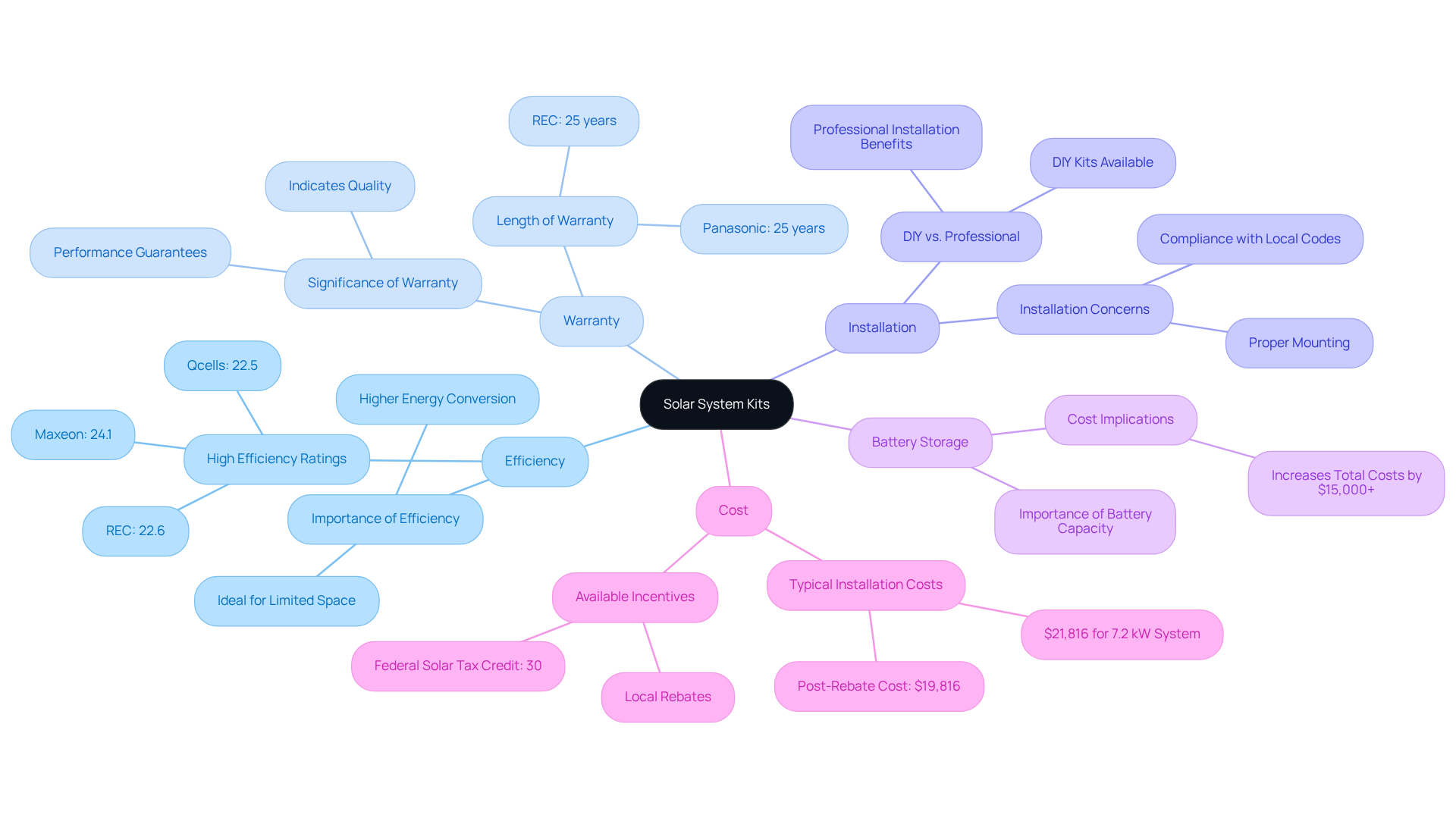
Comparative Analysis of Leading Solar System Kit Brands
Many homeowners are understandably concerned about rising energy bills. It’s common to feel overwhelmed by the options available when considering a shift to solar energy. Fortunately, several brands stand out in the solar system kit for home market, each offering unique features that can help you achieve energy independence.
- Renogy: Known for its high-quality off-grid kits, Renogy provides a range of products tailored to various energy needs. Their packages often come with strong warranties and outstanding customer support, ensuring that you feel secure in your investment.
- EcoFlow: If you enjoy camping or off-grid living, EcoFlow’s portable energy solutions are perfect for you. They emphasize ease of use and quick setup, making it simple to enjoy sustainable energy wherever you go.
- Goal Zero: This brand is a favorite among outdoor enthusiasts, focusing on portable solar power systems. Their user-friendly sets are designed for mobility, allowing you to harness the sun’s energy on your adventures.
- Rich Solar: Offering a balance of affordability and performance, Rich Solar is well-regarded for their customer service and comprehensive installation guides. They make transitioning to a solar system kit for home a smoother experience for everyone.
- Grape Solar: Recognized for their grid-connected setups, Grape Solar provides dependable packages that are simple to install and come with strong warranties, giving you peace of mind.
Together, we can explore these options and find the right fit for your energy needs. Imagine the freedom of generating your own power and reducing those monthly bills! If you’re ready to take the next step towards a sustainable future, don’t hesitate to reach out for support and guidance. We’re here to help you every step of the way.
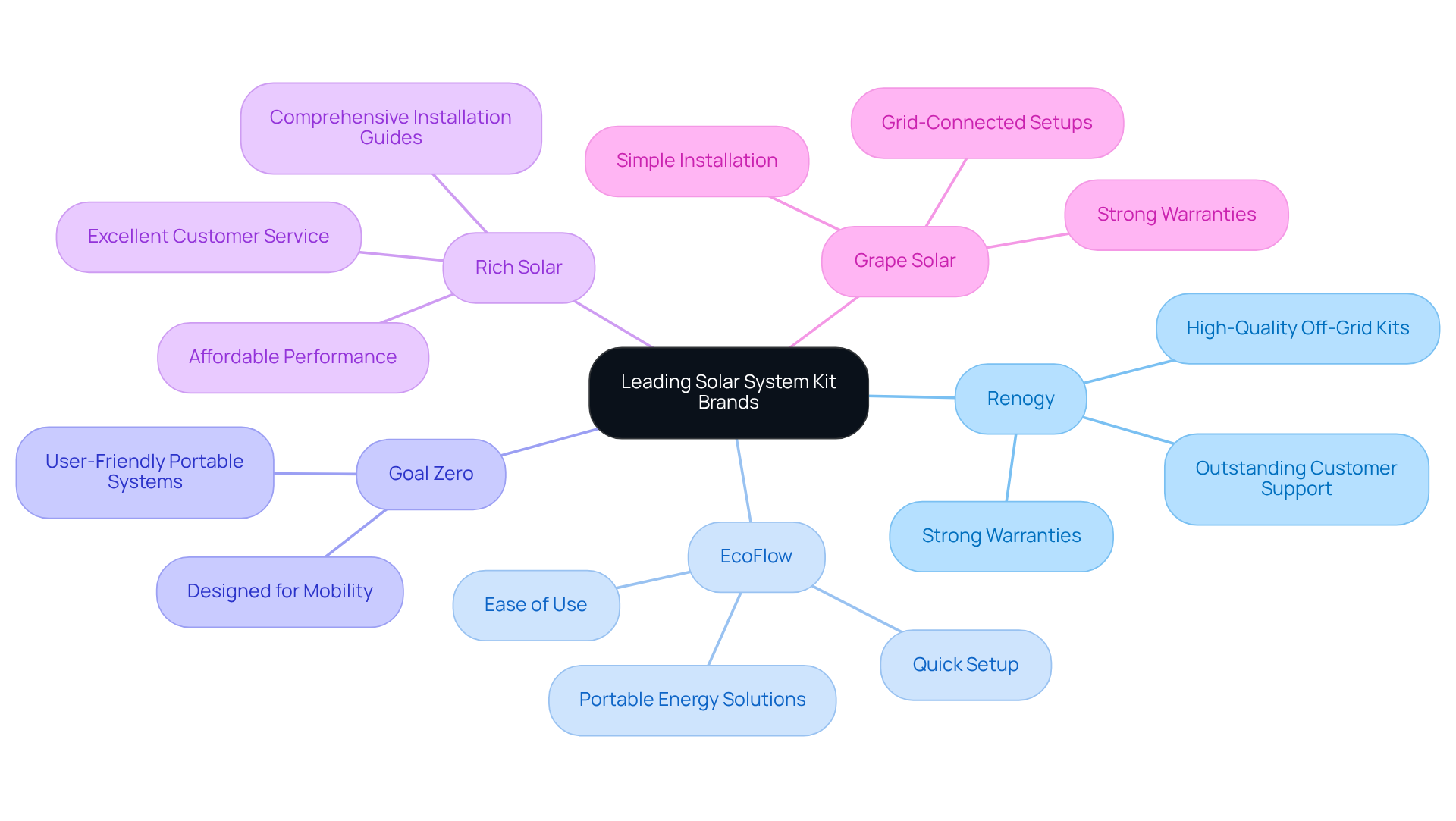
Evaluating Suitability: Pros, Cons, and Considerations for Homeowners
When considering a solar system kit for home, we understand that homeowners often feel overwhelmed by the prospect of rising energy bills. It’s essential to weigh the advantages and disadvantages of each option available to you:
-
Off-Grid Kits:
- Pros: These kits offer complete energy independence, making them a wonderful choice for remote locations where grid access is limited. Imagine the peace of mind that comes with knowing you’re self-sufficient.
- Cons: However, they typically involve higher initial costs, often ranging from $8,000 to $15,000, and can be complex to install, sometimes requiring professional assistance. It’s common to feel apprehensive about these upfront investments, such as a solar system kit for home.
-
Hybrid Kits:
- Pros: These kits provide the flexibility to utilize both grid power and battery storage, accommodating varying energy needs and ensuring reliability during outages. Homeowners often appreciate the ability to use a solar system kit for home to store surplus sunlight power for future use, thereby enhancing their autonomy. As renewable power specialist Ian Robinson notes, implementing a solar system kit for home can lead to ‘significantly reduced utility expenses from the grid and are considerably less reliant on the grid.’
- Cons: On the flip side, the inclusion of multiple components may lead to increased maintenance requirements, necessitating regular checks and potential battery replacements, which typically last 7 to 10 years. It’s wise to budget for these recurring expenses, such as a solar system kit for home, to avoid surprises down the line.
-
Grid-Tied Kits:
- Pros: These options generally feature lower upfront costs, often around $20,000 to $40,000, and straightforward installation, making them accessible for many homeowners. They can lead to significant savings on electricity bills by allowing users to draw from the grid during peak times. This can be a comforting thought for those looking to ease their financial burden.
- Cons: However, dependence on the grid means that power is unavailable during outages unless a battery backup is incorporated. It’s understandable to seek solutions that provide reliability during unexpected situations.
As you evaluate these options, consider your power usage habits, the available installation area, and local guidelines regarding renewable power setups. Additionally, federal rebates accessible until 2024 can lower the price of a solar system kit for home by 26%, enhancing the accessibility of solar power. Together, we can navigate these factors to help you make informed decisions that align with your energy goals and financial considerations. Remember, you’re not alone in this journey—support and guidance are just a step away.
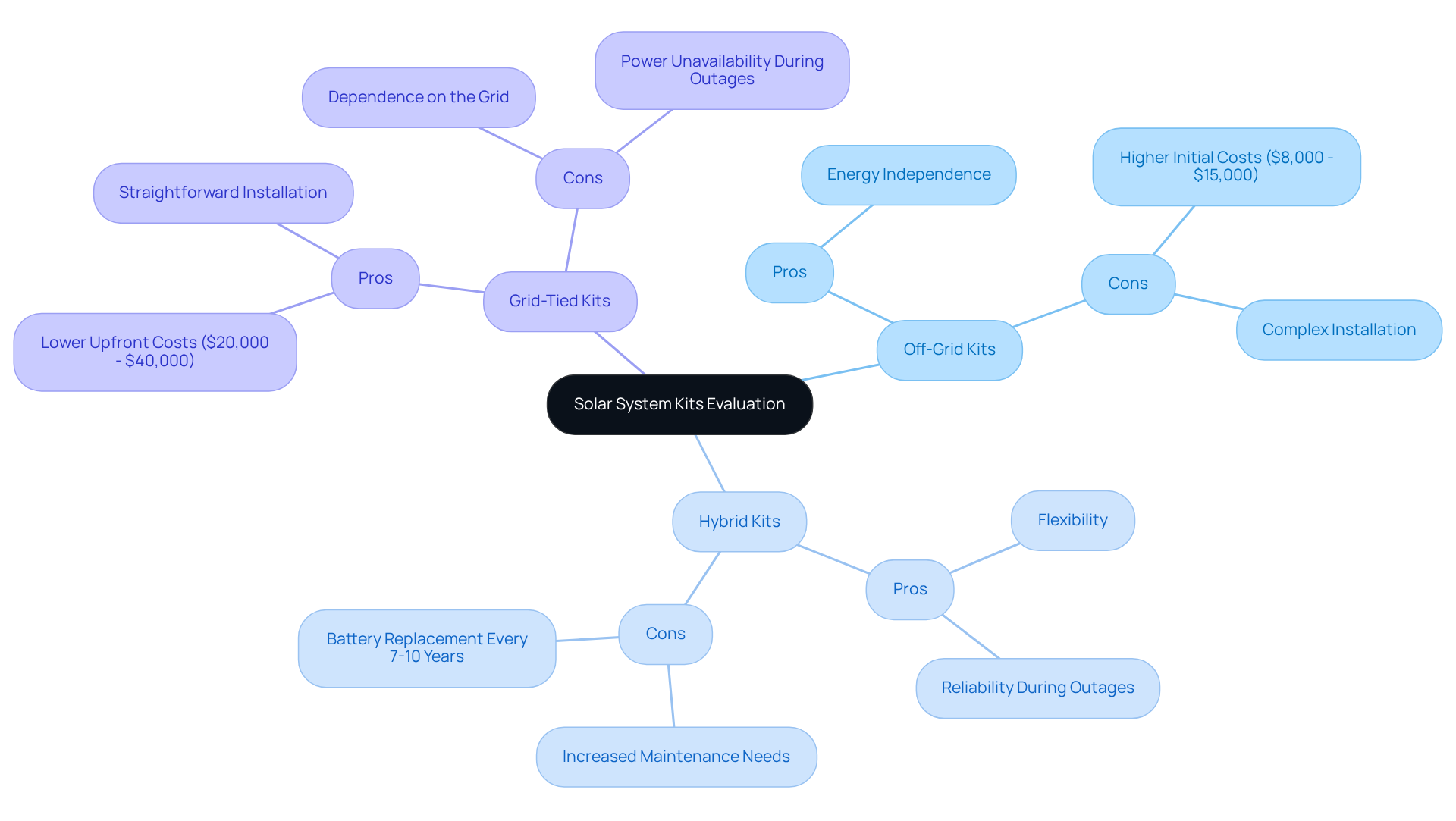
Conclusion
Investing in a solar system kit for your home is not just a strategic decision; it’s a step towards energy independence and significant financial savings. We understand that many homeowners are concerned about rising energy bills. By exploring the various types of solar kits—off-grid, hybrid, and grid-connected—you can find a solution that aligns with your energy needs and lifestyle preferences. This choice not only contributes to a sustainable future but also enhances your property value, making solar energy an appealing long-term investment.
As you consider this transition, key features such as efficiency, warranty, installation ease, battery storage, and overall cost are crucial factors to weigh in your decision. Brands like Renogy, EcoFlow, Goal Zero, Rich Solar, and Grape Solar each offer unique benefits tailored to different homeowner needs. This ensures that there are options available for every situation. The comparative analysis of these brands provides valuable insights into making an informed decision, whether you’re looking for off-grid living, camping, or enhancing energy savings in grid-connected homes.
Ultimately, embracing solar energy is more than just about reducing utility bills; it represents a commitment to a more sustainable lifestyle and a proactive approach to energy resilience. It’s common to feel overwhelmed by the choices available, but as the demand for renewable energy solutions continues to grow, exploring solar system kits can position you at the forefront of this movement. Together, we can harness the sun’s power and contribute to a greener future. Your investment in solar technology today can yield substantial benefits for both your household and the environment tomorrow. Let’s take this journey towards sustainability together.


